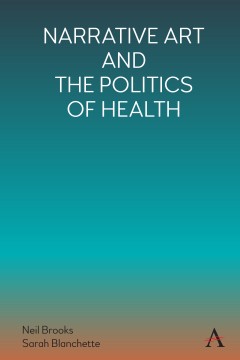Narrative Art and the Politics of Health
Edited by Neil Brooks & Sarah Blanchette
Anthem Series on the Politics and Literature of Global Rights and Freedom
Other Formats Available:
- About This Book
- Reviews
- Author Information
- Series
- Table of Contents
- Links
- Podcasts
About This Book
As countless alterations have taken place in medicine in the twenty-first century so too have literary artists addressed new understanding of disease and pathology. Dis/ability studies, fat studies, mad studies, end-of-life studies, and critical race studies among other fields have sought to better understand what social factors lead to pathologizing certain conditions while other variations remain “normalized.” While recognizing that these scholarly approaches often speak to identities with radically different experiences of pathologization, this collection of essays is open to all critical engagements with narratives of health in order to facilitate the messiness of cross-disciplinary collaboration and interdisciplinarity. As scientific advances provide insight into a wide range of well-being issues and help extend life, it is vital that we come to question the very categories of healthy and unhealthy. This collection brings together analyses of cultural productions which probe those categorizations and suggest new psychological and philosophical understandings which will help better apply and guide the knowledge being rapidly developed within the life sciences. “Right of health” is a widely accepted human right, but in applying a right to healthcare what care and what sort of health are less universally agreed upon. The contributors share an interest in addressing who controls answers to the questions of “how do we define a healthy body and a healthy life?” and “what are the political forces that influence our definitions of health?”
Although not all contributions take a feminist lens, feminist thought has questioned the medical community’s response to women’s bodies, contributed to the de-stigmatization of difference, and challenged gendered binaries. Consequently, many of the essays are informed by the possibilities enabled through the work of feminist scholars. Just as feminist writing positioned storytelling as a way of overcoming the way women’s bodies were defined as unfit and inferior, so too are literary and visual artists exploring how empowering personal and cultural expressions of dis/abled bodies, mad bodies, trans bodies, fat bodies, racialized bodies, and aged bodies among others can overcome pathologizing normative standards.
The globalization of healthcare protocols has brought many advances but also challenges to traditional understanding of health within many cultures. This collection includes papers that examine narratives of health from all countries, cultures, and communities and is not limited to a North American or Western locus. Further, just as Edward Said problematized “travelling theory” this book hopes to bring together scholars who look at how literary works also show that medical interventions from a Western perspective need to be challenged when applied to communities whose voices are often not heard or deliberately undermined when those “treatments” are developed.
Reviews
“This timely book collects a diverse set of essays that examine the stories we tell about our own and others’ health. The collection sparkles with intellectual curiosity and critique, illuminating myriad ways we have been shaped by cultural narratives about health and well-being.” — Joel Rodgers, Lecturer, Department of English, University of Toronto Scarborough
In their edited volume, Narrative Art and the Politics of Health(Anthem, 2021), Neil Brooks and Sarah Blanchette aptly argued, “as scientific advances provide insight into a wide range of well-being issues and help extend life, it is vital that we come to question the very categories of healthy and unhealthy.” I want to address this topic considering one aspect of women’s lives and that is the athletic domain. - Dr. Maryam Farahani, Research Associate at the University of Liverpool, Anthem Blog Post, July 2022.
Author Information
Neil Brooks is Chair of the Department of English and Cultural studies at Huron University College, London, Ontario, Canada.
Sarah Blanchette is a PhD candidate in the Department of English at Western University, London, Ontario, Canada.
Series
Anthem Series on the Politics and Literature of Global Rights and Freedom
Table of Contents
List of Figures; Acknowledgments; Notes on Contributors; Introduction, Neil Brooks and Sarah Blanchette; PART I. INSTITUTIONAL NARRATIVES; Chapter 1. The Laboring Body and the Slave Trade: An Enduring Narrative of Health and Illness, Mitchell Gauvin; Chapter 2. Projecting Eugenics and Performing Knowledges, Evadne Kelly, Seika Boye and Carla Rice; Chapter 3. Grief Supremacy: On Grievability, Whiteness and Not Being #allinthistogether, Jennifer Poole and Carmen Galvan; Chapter 4. Creating Categories, Eli Clare; PART II. SOCIOCULTURAL NARRATIVES; Chapter 5. Mothers Who Know Best: Narratives of Motherhood and Epistemological Anxieties in Vaccine Hesitancy Discourse, Jessica Polzer and Pamela Wakewich; Chapter 6. The Cultural Production of Commodifying Under Resourced Bodies, Aaron Martin, Clarisa Barrera Garza, Mubashar Khan and Lauren McKenzie; Chapter 7. When Progressivism Goes Mad: Spiritualism and the Euthanization of the Spiritually Unfit, Dan Graham; Chapter 8. American and Taiwanese Conceptions of Suicide in Emily X. R. Pan’s The Astonishing Color of After, Gracie Marsden; PART III. FICTIONAL NARRATIVES; Chapter 9. Sadness, Madness and Vigor in Jessie Redmon Fauset’s The Chinaberry Tree, Patricia A. Milanes; Chapter 10. Death, Cruelty and Magical Humanism in the Fiction of Terry Pratchett, Christopher Lockett; Chapter 11. Mental Illness and Radical Caregiving in Sepia Leaves and Em and the Big Hoom, Amala Poli; Chapter 12. Cast-off Casts: The Orthopedic Imagination in Dear Evan Hansen and Lady Bird, Matthew Tomkinson; Index.
Links
Stay Updated
Information
Latest Tweets



